Archive for September, 2013
It’s four o’clock and the dog is puzzled
26 September 2013 | This 'n' that
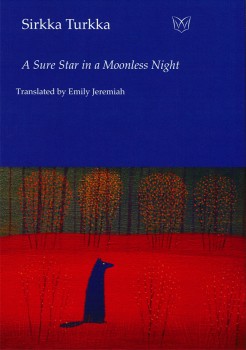
Cover image: ‘Autumn reflections’ by author and painter Saara Tikka
Apart from writing poetry for forty years, Sirkka Turkka has worked as a stable master and as a librarian – and she is a wizard in creating portraits of dogs in her poems.
‘Something kept me awake late. Something woke me up early. It’s four o’clock and the dog is puzzled. He tries to continue his dream: he was just about to catch a squirrel he barked at all of yesterday. He leaves me quite alone in silence, in which not a single breeze stirs. What is in the past ceases to be, what is to come has no significance. There is only the sun, just about to come up. And the calm surface of the lake and the coffee cup, from which leisurely steam rises.’ (From Minä se olen [‘It’s me’], 1973)
Elk, horse, raven, reindeer, jackdaw, fox. Turkka’s universe is populated with creatures, often wiser than man: man may have lost his heart, or ‘he thinks it’s a distant land’, but ‘in dogs the heart is where it should be: just after the muzzle, boulder-like, baby-faced and willing.’ (From Yö aukeaa kuin vilja [‘The night opens like corn’], 1978).
Emily Jeremiah, scholar and translator (her work includes poems by Eeva-Liisa Manner, novels by Asko Sahlberg and Kristina Carlson), found Turkka’s creatures a while ago, and as a result a selection of Turkka’s poems, entitled A Sure Star in a Moonless Night, was published recently by Waterloo Press (UK).
Melancholy: it does go well with autumn, doesn’t it? ‘Once more the stars are like a tearful ballad, and always in the evenings / the dogs tune their cracked violins.’ (From Mies joka rakasti vaimoaan liikaa [‘The man who loved his wife too much’, 1979])
Speaking with silence
26 September 2013 | Reviews
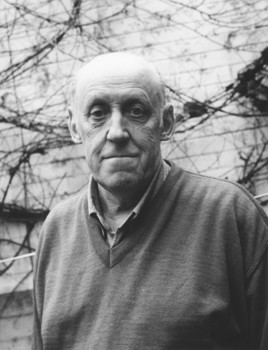
Bo Carpelan. Photo: Charlotta Boucht / Schildts & Söderströms
Bo Carpelan
Mot natten
[Towards the night. Poems 2010]
Helsinki: Schildts & Söderströms, 2013. 69 p.
ISBN 978-951-52-32-20-5
€21, paperback
‘Don’t change, grow deeper ,’ wrote Bo Carpelan: over the years he broadened his poetic range and his personal idiom evolved, but it happened organically, without sudden upheavals of style or idea.
Mot natten (‘Towards the night’) is Carpelan’s last collection of poems. This is underlined by the book’s subtitle, Poems 2010. By then Carpelan (1926–2011) was already marked by the illness that took his life in early 2011. It doesn’t show in the quality of the poems, but knowing it may make it harder for the reader to approach them with unclouded eyes. When a great poet concludes his work one wants to seek a synthesis or a concluding message, and that may encumber one’s reading. So is there such a message? In some ways there is, but Carpelan was not a man of pointed formulations. His ideals emerged without much fuss. More…
Solid, intangible
26 September 2013 | Fiction, poetry
Poems from Mot natten. Dikter 2010 (‘Towards the night. Poems 2010’, Schildts & Söderströms, 2013). Introduction by Michel Ekman
Memory
If you give me time
I don’t weigh it in my hand:
it’s so light, so transparent
and heavy as the thick
shining darkness
in the backyard gateway
to memory
Kari Hotakainen: Luonnon laki [Law of nature]
26 September 2013 | Mini reviews, Reviews
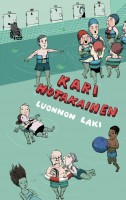 Luonnon laki
Luonnon laki
[Law of nature]
Helsinki: Siltala, 2013. 283p.
ISBN 978-952-2341853
€23.90, hardback
Kari Hotakainen’s twelfth novel is characterised by a dramatic plot. A year and a half ago, the author had a car crash, which he miraculously survived. Luonnon laki draws on Hotakainen’s experience, at the same time continuing the series started by his last two novels, with their commentaries on the contemporary world. The main character, the entrepreneur Rauhala, wakes up in hospital after a car crash and begins the slow process of recovery and rehabilitation. Incapable of movement and dependent on the care of others, the man has time to think – to think, for example of the free healthcare service of a welfare state such as Finland, whose cost, in his case, is high. Ideologically estranged from her father, his daughter is about to give birth to her first child; Rauhala himself is essentially reborn and makes peace with his daughter. Both melancholy and amusing, linguistically rich and delicious in its associatons, this tale and its characters are highly enjoyable.
Translated by Hildi Hawkins
AZ661748
19 September 2013 | Fiction, Prose
A short story from Novelli palaa! Matkanovelleja (‘The short story returns! Travel stories’, edited by Katja Kettu and Aki Salmela; WSOY, 2013)
Mum didn’t want to travel abroad. Mum wanted to tend her rose garden and her pea beds, which sloped down the hill towards the lake. In mum’s opinion, the view from the porch was the best view in the world.
Dad wanted to travel. He never got very far, because Mum wouldn’t go. Dad got as far as the neighbouring forest. In Mum’s opinion, there was no better long-haul destination than the lake at the bottom of the slope and the grove around the house, which was full of blueberries and raspberries and, in the spring, morel mushrooms.
In Dad’s opinion, the forest was full of mosquitoes and flies and ants and mites.
On the lake, the loons dived and called on late summer evenings, Mum thought it was the best sound in the world. Beautiful and harrowing, at the same time. The lamentations of the loon demonstrated that a living creature can be so completely happy that its cry is full of grief. Her children’s crying and whingeing and desire to go to the Linnanmäki funfair in Helsinki were, to Mum, a sign that they are ecstatically happy at home.
Little loons, Mum said to us. More…
Philip Teir: Vinterkrig. En äktenskapsroman [The winter war. A marriage novel]
19 September 2013 | Mini reviews, Reviews
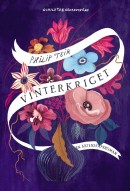 Vinterkrig. En äktenskapsroman
Vinterkrig. En äktenskapsroman
[Winter war. A marriage novel]
Helsingfors: Schildts & Söderströms, 2013. 326 p.
ISBN 978-951-52-3207-6
€26.70, hardback
Finnish translation:
Talvisota. Avioliittoromaani
Suom. (Translated by): Jaana Nikula
Helsinki: Otava, 2013. 347 p.
ISBN 978-9511269854
€30.30, hardback
This first novel by Philip Teir (born 1980) brings to mind a stereotype of the Finland-Swedish minority: pleasant, controlled, civilised and rather amusing. Teir has previously written short stories, and no doubt his work as a cultural journalist has sharpened his detailed perceptions of society and life in general. Hence, the result is controlled and rather amusing. In the focus are sociologist Max and personnel manager Katarina, who have in their long marriage become alienated from each other. Two grown-up daughters have problems of their own, as a working mother of small children, and as an arts student trying to find a direction for her life. Teir’s characters look for ways to solve their problems: Max seeks the company of a younger woman, whereas the more straightforward Katarina applies for a divorce. Yet, amidst confusion, Teir seems to place his trust in a traditional safety net, represented in the novel by the family and the community. The portrait of a middle-class, academic family with rather ordinary problems is ironically gentle: a pleasant reading experience.
What Finland read in August
12 September 2013 | In the news
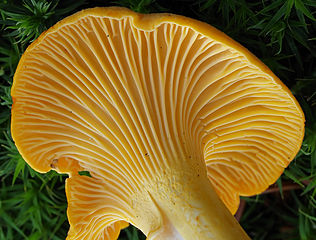
Cantharellus cibarius: very edible. Photo: Wikimedia/Andreas Kunze
The August list of best-selling fiction and non-fiction, compiled by the Finnish Booksellers’ Association, features thrillers, new Finnish fiction, dictionaries and diet guides.
Number one of the Finnish fiction list was a new crime novel by Leena Lehtolainen, Rautakolmio (‘The iron triangle’, Tammi). The new novel, Hägring (‘Mirage’, Schildts & Söderströms; in Finnish, Kangastus, Otava), by Kjell Westö, was number two; in third place was Aapine, an ABC-book written in the south-western dialect by poet and author Heli Laaksonen and illustrated by Elina Warsta (Otava).
The list of translated fiction included – not surprisingly – names like Dan Brown, Jon Nesbø, Camilla Läckberg, Charlaine Harris and Henning Mankell.
5:2 dieetti (The Fast Diet), by Michael Mosley and Mimi Spencer, sold like hot cakes – the Finns are statistically the fattest people in Scandinavia – and was number one on the non-fiction list. There were also several dictionaries (four of them Finnish-English-Finnish) as well as a field guide to mushrooms, of which there are plenty in the woods this early autumn. It is indeed essential to be able to tell the Poisonpie and the Sickener from the real deliciacies.
Cut time, paste space
12 September 2013 | Articles, Non-fiction
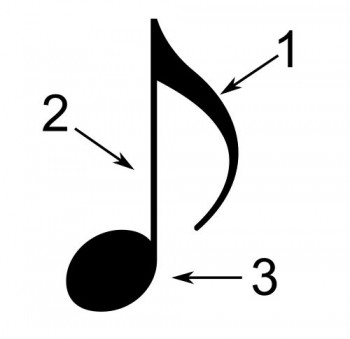
Back to basics. Parts of a musical note. Picture: Wikimedia
How different are the art of words and the art of sounds, author Teemu Manninen ponders, as he unexpectedly finds himself in the role of a musician in a performance. Time, space or both?
Some time ago I got the chance to participate in an unusual concert – as a performer: six players, myself included, were grouped around a table with a triangle in one hand and a glove in the other. Pieces of dry ice and a bucket of water were placed in front of each of us.
The performance began: we took a piece of dry ice and pressed it against the triangle. As the metal cooled, it burned through the ice, releasing gas, which in turn made the metal vibrate very fast. This produced a keening sound that filled the room. More…
Night of the Living….
5 September 2013 | In the news
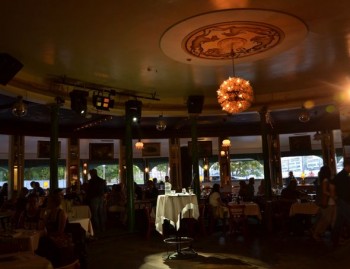
Poetry in focus: Kaisaniemi Restaurant, Helsinki, 24 August. Photo: Irene Dimitropoulos
…Poets was the main event of the annual literature festival Runokuu, Poetry Moon, taking place on 24 August in a Helsinki restaurant. The theme was the sea: the invited guests were from around the Baltic Sea – as well as beyond.
The Poetry Moon festival is organised by Nuoren Voiman Liitto and Helsinki Festival, now for the ninth time, with more than 30 events taking place in the city between 22 and 28 August.
‘In four hours writers and languages kept changing fast,’ reports Irene Dimitropoulos, an intern at FILI (Finnish Literature Exchange): ‘You had to throw yourself into the rhythms and sounds of languages both familiar and strange.
‘The programme contained lots of poetry, but the short story and non-fiction were also included. The idea of the literary evenings is to meet with writers from abroad and also to support translated foreign poetry, as very little gets translated into Finnish, so translators perform with poets.
‘The stylistic and thematic variations of different generations of writers were introduced in many ways. A translation of I Am Going to Clone Myself Then Kill the Clone and Eat It [2009/2012] by the American poet Sam Pink was published in Finnish earlier this year: his style, both simple and strikingly comical, and the way he depicts everyday experiences and the violent fantasies they invoke, made the audience laugh. Crowds were also drawn to listen to the Finnish novelist Monika Fagerholm and the German poet and translator Ulrike Draesner; Fagerholm read from her book of lyrical essays on the sea, Draesner her poems dealing with womanhood and the interaction between language and body.’
Among the other poets were Peeter Sauter and Maarja Kangro from Estonia, Igor Belov and Irina Maksimova from Russia and Toh Hsien Min from Singapore.
